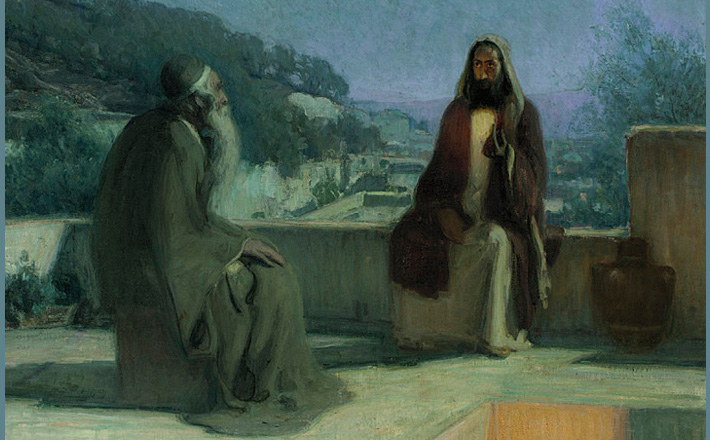Commentary on Psalm 121
The passages for the second Sunday of Lent all consider issues of human faith and God’s faithfulness.
Genesis 12:1-4a and Romans 4:1-5, 13-17 focus on Abraham and his faithful response to God’s call to leave his country, kindred, and father’s house (Genesis 12:1) and travel to the land God would show him. Thus, the subject of these passages is a journey that requires trust in God.
Psalm 121 also pertains to the journey of faith that requires reliance on God. The setting of the psalm is travel to or from Jerusalem as part of a religious pilgrimage. The psalm’s title, “A Song of Ascents” perhaps indicates the psalm was intended for use during pilgrimage to Jerusalem for one of Israel’s festivals. Though the significance of the term “ascents” is not absolutely certain, the same root appears in Psalm 122:4 to refer to a ritual journey to the holy city (see also Ezra 7:9; Psalm 24:3). Psalm 121 is part of a group of psalms (Psalms 120-134) placed together for that purpose.
Statements of confidence in God’s protection and declarations of God’s faithful character dominate Psalm 121. These statements and declarations appear together as a liturgy, as indicated by the shift in voices throughout the psalm. Verses 1-2, and possibly verse 4, seem to be voiced by a pilgrim, who perhaps represents the whole company of travelers. The remainder of the psalm may be the response of a priest if the setting is departure from the temple. Or the response may be the words of a travel leader, or one who is remaining at home, if the setting is the initial departure for Jerusalem. Regardless of the exact orientation of the travelers, the main issue in the psalm is the safety God provides through constant attention to the faithful pilgrims.
The psalm begins with a declaration in verse 1a (“I lift up my eyes to the hills”) that introduces the central concern of the poem in the form of a question in verse 1b (“from where will my help come?”). The answer appears clearly in verse 2a, “My help comes from the Lord.” The rest of the psalm expounds on this point: God alone can sustain the life of the pilgrim.
The psalmist qualifies the nature of God who “helps” (Psalm 121:2a) by identifying God as “maker of heaven and earth” (Psalm 121:2b). The same label occurs two other times in the “Songs of Ascent” (Psalms 124:8; 134:3). The last occurrence appears to be an editorial addition placed on a psalm that acts as conclusion to the collection (Psalms 120-134). Hence, it is possible that an editor understands “maker of heaven and earth” to be a central subject in this collection.
Why is this identification of God so important? Even if on a short journey to Jerusalem and much more on a lengthy trip, the traveler surely observed worship sites devoted to other deities (on “the hills”). Most of these other gods had devotees who claimed their god ordered the cosmos. Thus, to confess that the lord was “maker of heaven and earth” was to say these other deities were imposters.
Verses 3-4 also implicitly compare Yahweh to other deities with the declaration that Israel’s God “does not sleep or slumber.” It was a common belief among Israel’s neighbors that their gods “slept” (or died) during winter months and revived in seasons of growth and harvest. But the Lord did not sleep and therefore could keep constant watch over Israel and its pilgrims. The point appears emphatically by means of repeated occurrences of the word “keep” or “keeper” to describe what the lord does and who the lord is.
A worship leader or perhaps a leader of pilgrimage speaks the final four verses of the psalm. These verses take the form of a “blessing”; that is, they are confessional, but since they are spoken on behalf of the pilgrims they have the tone of wish and assurance. Verse 5 begins with a general statement about the character of the protector of the travelers (“your keeper”).
A new label, “your shade” then appears. This description of God is appropriate in a psalm of pilgrimage since shade was at a premium for travelers in the Palestinian countryside. However, the metaphor has other associations that should not be missed. In other passages (Psalms 36:8, 61:5) Yahweh’s “shade” is equated with the safety of the temple. Thus, the security the travelers felt in the place of worship was available to them also on their journey because God was with them.
Verse 6 lists the range of possible difficulties for the pilgrim: the sun by day, the moon by night. Mention of the moon may come from the ancient belief that the moon was a cause of lunacy. Both the sun and the moon were thought to represent deities: for example, the Egyptian god, Ra (the sun god) and the Mesopotamian, Nanna (the moon god). Verse 7 offers a final summary of Yahweh’s protection “from all evil” with a line that can be taken either as a wish (“may he keep you”) or a statement of what is typical (“he will keep you”). The psalm ends (verse 8) with final reference to Yahweh’s “keeping” vigil over future pilgrimage to the holy city (“coming in” and “going out”).
Psalm 121 was well-suited to help ancient travelers face the threats they encountered during travel. It is also quite appropriate for our “pilgrimage” through Advent on the way to Easter. Such a journey should be made in full recognition of false gods all around who compete for our devotion. Psalm 121 highlights a point made many other places in Scripture, that the Lord is “maker of heaven and earth,” the only one who gives and sustains life.


March 12, 2017